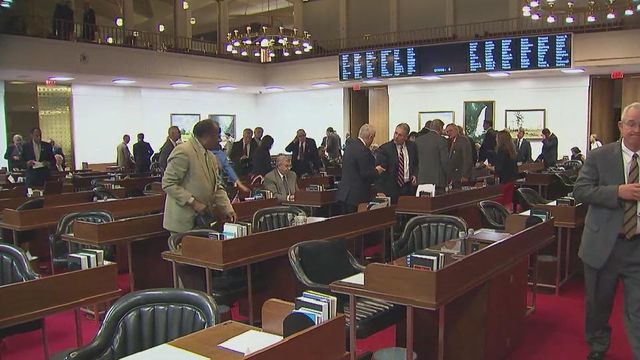House OKs bills on revenge porn, bail bonds training
In a legislative flurry leading up to the crossover deadline Thursday, House lawmakers approved more than 40 bills Tuesday, ranging from bail bondsmen to domestic violence to salacious online activity.
Posted — UpdatedA person whose images were posted by a former romantic partner would also be able to sue in civil court.
"This bill relates to issues in our modern era relating to the easy accessibility of photographs," said Rep. Rob Bryan, R-Mecklenburg.
Bryan pointed to sites that have, in the past, specialized in posting intimate images after a relationship ends in a breakup, a practice known as posting "revenge porn."
Rep. Marilyn Avila, R-Wake, asked her colleagues to pass House Bill 792, relaying the case of a family friend who had her name and picture posted.
"It caused tremendous anguish and suffering, not only for her but for her family," Avila said.
For cases that don't involve former partners, Bryan said, it's already a Class I felony under state law to secretly record video of someone for sexual gratification. The bill adds intent to harm or extort to the felony crime in an effort to capture people who may take secret video of others to post online.
Both bills are now headed to the Senate.
Under the program, offenders would be tracked to ensure they avoid certain areas. For example, they may be prohibited from being within 1,000 feet of a former spouse's house. If the GPS tracking device determines the person has violated their agreement, a deputy can be dispatched to search for the person and ensure they don't engage in any more violent behavior.
Rep. Sarah Stevens, R-Surry, asked Rep. Donny Lambeth, R-Forsyth, how much the program would cost. Lambeth said there would be no state cost. Forsyth County, he said, would pay for the program.
Rep. Allen McNeil, R-Randolph, said a similar program had been set up in Randolph County by way of a court order. Offenders in that program, he said, were asked to pay the $8-per-day cost of tracking them.
The measure now goes to the Senate.
Senate Bill 738 in the 2011-12 session required all bail bondsmen seeking or holding a license to receive training from the North Carolina Bail Agents Association. But there was another group, the North Carolina Bail Academy, that was also in the business of providing training. That group, frozen out by the legislation, took the matter to court, where it's currently under litigation.
Stevens tried unsuccessfully to remove the section of House Bill 641 that ends the monopoly. "There is currently a lawsuit pending about whether this bill is constitutional or not, and we should let the courts decide before we jump in and resolve it," she said.
Rep. Paul "Skip" Stam, R-Wake, opposed the move, saying he didn't realize until after he voted on the 2012 bill that it was a monopoly that violates the state constitution.
"Although it’s not customary to resolve lawsuits by legislation, there’s no reason we can’t if we realized we’ve passed an unconstitutional bill," Stam said. "When we know we’ve made a mistake, we ought to rectify it as soon as possible."
The legislation passed easily with the provision overturning the monopoly intact. It now goes to the Senate.
Related Topics
• Credits
Copyright 2024 by Capitol Broadcasting Company. All rights reserved. This material may not be published, broadcast, rewritten or redistributed.






